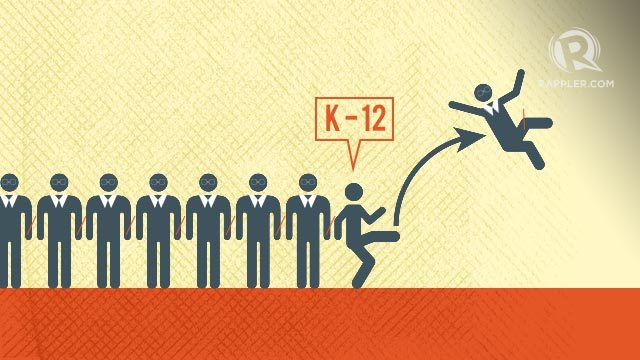SUMMARY
This is AI generated summarization, which may have errors. For context, always refer to the full article.

MANILA, Philippines – The law that promises to produce employable Filipino high school graduates is, ironically, causing panic among presently employed educators in higher education institutions (HEIs).
A group of professors from various colleges and universities on Independence Day, June 12, expressed their fear that thousands of teaching and non-teaching personnel will be affected starting 2016. This is when the senior high school curriculum under the K to 12 program will be implemented nationwide.
With the signing of the Enhanced Basic Education Act of 2013, two years have been added to the basic education system of the Philippines. (INFOGRAPHIC: 10 things about K to 12)
The first batch of students under the program will enter senior high school’s grade 11 in 2016, and grade 12 in 2017. (READ: What senior high school tracks fit your locality?)
Because of this, HEIs expect a drop in enrollment during these two years all the way to school year 2021-2022 when things are expected to normalize.
Rene Tadle, internal vice president of the University of Santo Tomas’ faculty union, estimated around 30,000 professors and 15,000 non-teaching staff will be affected either by retrenchment to prevent losses, redundancy, or early retirement.
Tadle said professors of general education will be the most affected during the rollout of the senior high school curriculum in 2016. (READ: CHED to colleges: Rethink business model)
“You have to understand the school also. ‘Pag walang estudyante, eh di magbabawas sila [ng empleyado],” he added. (Without students, they will cut the number of employees.)
But the problem, he said, is that those who will be asked to choose early retirement may be too young to retire and too old to find another job. Losing a teaching job also means loss not only of income, but also of benefits.
“Granted, maganda ang maidudulot sa estudyante [ng K to 12], pero gumawa sila ng legislation na hindi na-consider ang implication sa labor [sector],” Tadle said. (Granted, K to 12 will be beneficial to students, but they crafted legislation that did not consider implications on the labor sector.) (READ: Senators ask: Are colleges ready for K to 12?)
Last recourse
Benjo Benavidez, officer-in-charge of the Bureau of Labor Relations at the Department of Labor and Employment (DOLE), said displacement will be the last recourse since schools with secondary education can move some of their faculty members to teach senior high school.
But Tadle asked if the professors will be paid the same amount once they teach in high school. Another concern is that teaching in high school when one has been a professor in college would require a lot of adjustment.
Benavidez also noted the Labor Code of the Philippines provides strict rules for retrenchment:
- It is intended to prevent losses and such losses are proven
- Written notices are served on the workers and the Department of Labor and Employment at least one month before the effective date of retrenchment
- Separation pay is paid to the affected workers
“It has been interpreted by the Supreme Court that not all losses shall justify termination of employment,” he said.
The implementing rules and regulations (IRR) of the K to 12 program mandates concerned government agencies – including DOLE – to come up with a joint issuance that will “ensure the sustainability of private and public educational institutions and the promotion and protection of the rights, interests, and welfare of teaching and non-teaching personnel.”
According to the IRR, the issuance was supposed to have been released 60 days after the implementing rules take effect, but Benavidez said the guidelines have yet to be released – most likely before the end of June.
“Prior to 2016, walang nakikinitang displacement. Itong guidelines ay bilang paghahanda sa displacement kung meron man sa 2016,” he explained. (Prior to 2016, we do not expect any displacement. But these guidelines will be in preparation for possible displacements in 2016.)
‘Engage schools, government’
Tadle noted that 90% of HEIs in the country have no labor unions. This worries him, because teaching and non-teaching personnel in these schools may be prone to abuse come 2016. (READ: PH basic education: ‘Cramming’ toward ASEAN 2015)
Benavidez said DOLE will be open to hearing any complaints and will coordinate with employers if necessary.
As for the rest of the schools with labor unions, he urged them to use those as avenues to conduct dialogues with their school administrators.
Still, Tadle called on the government to have a sense of urgency when it comes to this issue.
“That’s precisely the point. We feel that the greater sector of government does not have that sense. Ang sinasabi palagi, 2016 pa raw. But the real score is, right now, may mga effects na. And in the first place, sino bang nag-introduce [nitong K to 12]? Tapos ngayon kami ang sasagot,” he said.
(That’s precisely the point. We feel that the greater sector of government does not have that sense. They always say it will happen in 2016 yet. But the real score is, right now, this already has effects. In the first place, who introduced K to 12? Then now we’re suffering the consequences.)
ACT Teachers Representative Antonio Tinio also urged teachers to engage with their school administrators and the government.
“It’s an ideal time to engage w/ DOLE, CHED [and] DepEd…because they will go to Congress for budget hearings,” he said.
Tinio was among 8 lawmakers in the House of Representatives who voted against the K to 12 bill during the final reading in the 15th Congress. – Rappler.com
Add a comment
How does this make you feel?
There are no comments yet. Add your comment to start the conversation.